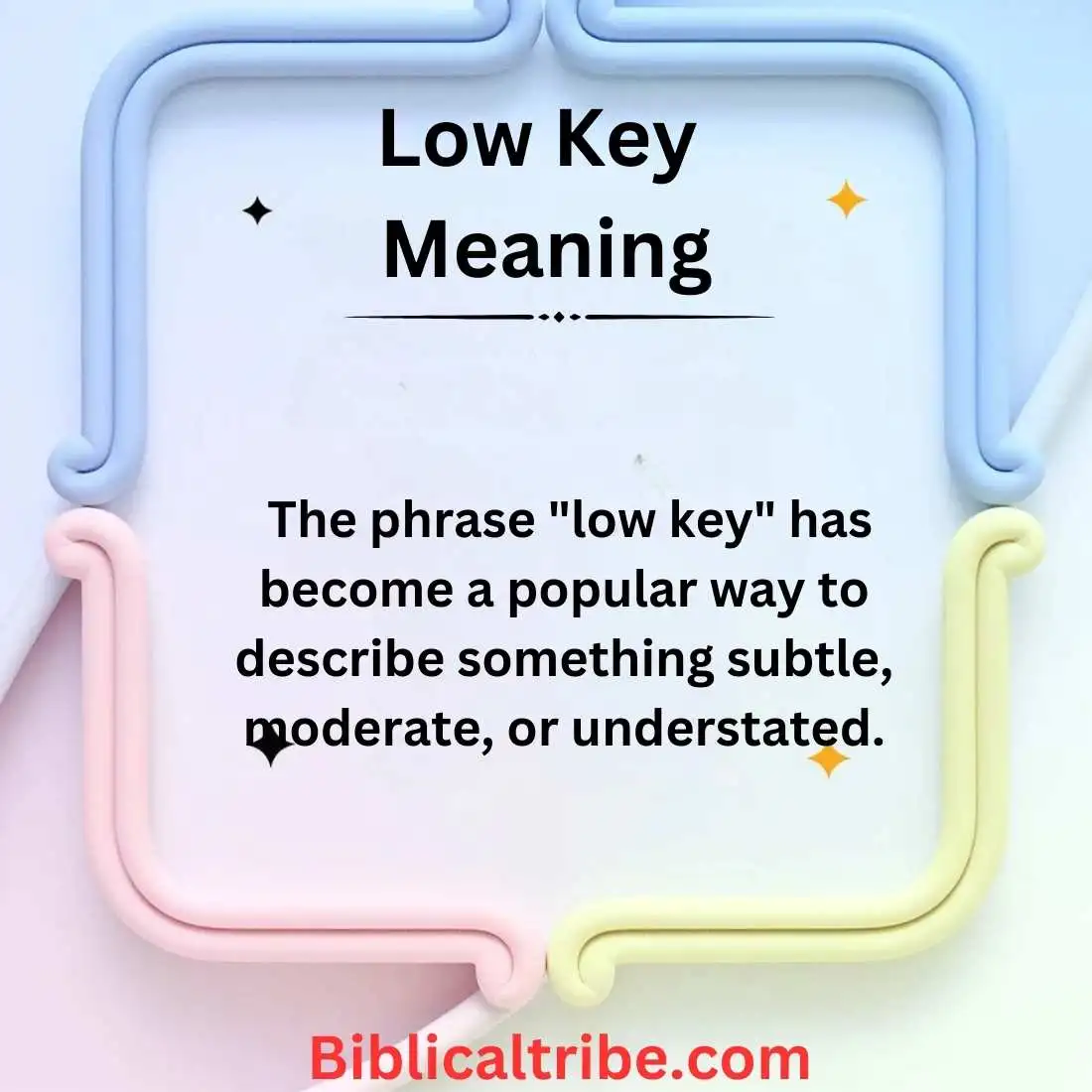Last Updated on February 13, 2025 by Ethan Richards
The phrase “low key” has become a popular way to describe something subtle, moderate, or understated. While it is widely used in informal conversations, there are times when a different phrase might be more appropriate, especially in professional or formal settings.
This article explores the meaning of “low key,” its various uses, and alternative expressions based on different tones and contexts. Whether you need a casual replacement for texting or a more polished phrase for work, we’ve got you covered.
What Does “Low Key” Mean?
“Low key” is often used to describe something that is not intense, exaggerated, or extreme. It can also imply a sense of secrecy or understatement.
Common Uses of “Low Key”
- Describing Feelings: “I’m low key excited about the trip.” (I’m excited, but not overly so.)
- Expressing Preferences: “I low key love this song.” (I like this song but don’t want to make a big deal about it.)
- Indicating Secrecy: “I low key don’t want anyone to know.” (I would rather keep this quiet.)
- Toning Down Statements: “I low key hate doing chores.” (I dislike it, but I’m not dramatic about it.)
Since “low key” is an informal phrase, using it in professional emails, reports, or business discussions may not always be suitable. Below, we explore various alternatives that fit different situations.
Alternatives to “Low Key” Based on Context
Professional Alternatives
For workplace communication or formal situations, replacing “low key” with a more polished phrase can help maintain professionalism.
- Moderately – “I’m moderately interested in the proposal.”
- Somewhat – “I am somewhat concerned about the timeline.”
- To a certain extent – “I agree with you to a certain extent.”
- Slightly – “I’m slightly hesitant about the changes.”
- Mildly – “She was mildly amused by the idea.”
Polite Alternatives
For polite or diplomatic conversations, use these alternatives to maintain respect and courtesy.
- Gently – “I gently suggest we reconsider our approach.”
- A bit – “I’m a bit worried about the outcome.”
- Quietly – “She quietly preferred to stay out of the debate.”
- Rather – “It was rather surprising to hear that.”
- Kind of – “I kind of like the new design.”
Casual and Everyday Alternatives
For casual conversations, friendly chats, or texting, these words capture the same tone as “low key.”
- Sort of – “I sort of enjoyed the movie.”
- Kinda – “I kinda want to stay in tonight.”
- Chill – “Let’s keep the party chill.”
- A little – “I’m a little tired today.”
- On the down-low (DL) – “Let’s keep this on the DL.”
Creative and Unique Alternatives
If you want to add a unique touch to your conversations, try these expressions.
- Under the radar – “I want to keep my project under the radar for now.”
- Subliminally – “I subliminally hope she notices my effort.”
- Not making a big deal out of it – “I’m not making a big deal out of it, but I do care.”
- Hush-hush – “Let’s keep this news hush-hush.”
- Soft launch – “I’m doing a soft launch of my new hobby.”
Texting Examples Using “Low Key” Alternatives
Here are some texting examples that replace “low key” with suitable alternatives:
- Before: “I low key want to skip the gym.” After: “I kinda want to skip the gym.”
- Before: “I low key love this song.” After: “I quietly love this song.”
- Before: “I low key think she’s right.” After: “I sort of think she’s right.”
- Before: “I low key don’t want to go out tonight.” After: “I’m a bit reluctant to go out tonight.”
- Before: “I low key don’t trust him.” After: “I slightly don’t trust him.”
- Before: “I low key feel bad about this.” After: “I mildly feel bad about this.”
- Before: “I low key miss those days.” After: “I quietly miss those days.”
- Before: “I low key hope he texts first.” After: “I subtly hope he texts first.”
- Before: “I low key hate Mondays.” After: “I kinda dislike Mondays.”
- Before: “I low key don’t want this to end.” After: “I softly don’t want this to end.”
Choosing the Best Alternative: Factors to Consider
The Setting
- Formal settings: Use “moderately” or “somewhat.”
- Casual settings: Use “kinda” or “sort of.”
- Secretive settings: Use “on the DL” or “hush-hush.”
The Audience
- Friends and family: Informal alternatives work best.
- Colleagues and superiors: Professional expressions are better.
- Public speaking or writing: Use clear and precise language.
The Tone
- Serious tone: Use “mildly” or “slightly.”
- Playful tone: Use “kinda” or “chill.”
- Secretive tone: Use “under the radar.”
Conclusion
“Low key” is a versatile phrase that adds subtlety to speech, but in some situations, an alternative phrase might be more appropriate. Whether you’re writing a formal email, having a casual chat, or sending a text, choosing the right alternative can enhance clarity and effectiveness.
By using the suggestions in this article, you can express yourself more precisely and adapt your language to different settings. Next time you find yourself about to say “low key,” try one of these alternatives instead!

Ethan Richards is an accomplished author and dream interpreter known for his insightful and thought-provoking analyses. With a keen eye for detail and a passion for biblical studies, Ethan helps readers unlock the secrets of their dreams, offering clarity and spiritual enlightenment.










